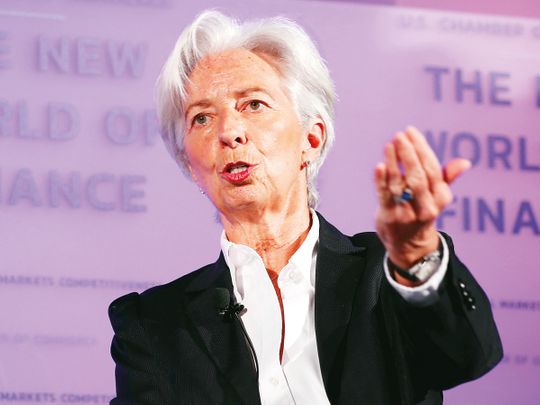
Christine Lagarde, nominated on Tuesday to lead the European Central Bank, will need all her proven attributes, and help from others, to succeed as the new leader of one of the world’s three most systemically important central banks.
An inspired choice, she is uniquely well placed to build on her accomplishments as the managing director of the International Monetary Fund. In tapping Lagarde for Europe’s most visible economic post, Europe’s political leaders established several precedents:
Lagarde stands out in being the first non-economist to hold the post, the first woman, and the first combining such deep public-private experience, as well as the combination of national and multinational policymaking.
Able to engage seemingly with many audiences, she has star quality that few if any of her predecessors possessed.
She has already acquired significant crisis management experience, first as France’s finance minister during the global financial crisis and then at the IMF where she played a pivotal role in rescue operations for several countries, including Eurozone members and Argentina.
To overcome her lack of formal academic economic training and central banking experience, Lagarde is likely to repeat a game plan that worked extremely well during her tenure at the IMF: surrounding herself with experts, working hard, showing extraordinary command of briefs, and asking the right questions at the right time to iterate to solutions.
Interacting with the external world has become a key requirement for central bankers at a time when their operation, and political autonomy, face increasing scrutiny.
Here, Lagarde stands to benefit from her strong communication and interpersonal skills, as well as her ability to navigate political cross-currents. She will need all this, and more, inheriting from Mario Draghi a Eurozone facing four considerable challenges:
Eroding policy flexibility and effectiveness after too many years of the ECB being “the only game in town” policy-wise; A weakening regional economy that risks slipping back into stall-speed economic growth, excessive disinflation, and renewed pockets of debt instability; A more fragmented regional and less stable political landscape for the members of the Eurozone that already have differentiated and complicating economic and financial conditions; and a tricky global environment, including on account of trade tensions and technological disruptions.
In addition to her considerable political skills, Lagarde will need to draw on the deep knowledge of her advisers and staff to ensure the technical expertise and dominance needed to establish consensus from a Governing Council consisting also of the heads of the national central banks of member countries.
In communicating to markets, she will need to combine her engaging plain-speaking style with the sort of “constructive ambiguity” that provides central banks with sufficient policy flexibility during an unusually uncertain time for the regional and global economies.
Finally, she will depend on the help of others. For the ECB to remain effective and credible, Europe’s politicians must come together not only progress on the much-delayed policy handoff from excessive reliance on monetary policy to a more holistic combination of pro-growth measures, but also complete the Eurozone’s economic and financial architecture.












